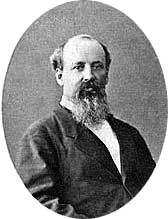 Image via Wikipedia
Image via WikipediaOn Thursday, March 28, 1861, General-in-Chief Winfield Scott gave President Abraham Lincoln a disturbing memorandum expressing his views of Forts Sumter and Pickens.
Up until this time, Scott had been declaring that an attempt to reinforce Fort Sumter was virtually impossible, but was all for reinforcing Fort Pickens. Now, suddenly, he was opposed to reinforcing Sumter and Pickens, and was basing his opposition on political, not military grounds.
"Our Southern friends, however, are clear that the evacuation of both the forts would instantly soothe and give confidence to the eight remaining slaveholding states, and render their cordial adherence to the Union perpetual...indeed, the giving up of Forts Sumter and Pickens may be best justified by the hope that we should thereby recover the State to which they geographically belong by the liberality of the act, besides retaining the eight doubtful states."After a state dinner at the White House -- the first for the new administration -- Lincoln called an emergency cabinet meeting. After Lincoln read the memo and the initial shock wore off, Postmaster General Montgomery Blair, the only cabinet member heretofore wholeheartedly in favor of reinforcing Sumter despite the consequences, declared that Scott was out of line, "playing the part of a politician, not a general."
The cabinet would meet again the next day. In the meantime, the members would once again put their ideas on the subject of reinforcing the forts down on paper.
Whether or not Scott's memorandum was the culprit, the cabinet had made an almost complete turnaround from their earlier thoughts on the matter. Now everyone agreed that Fort Pickens should be reinforced regardless of the consequences. On Fort Sumter, the opinions were a little more varied, but almost everyone agreed that the attempt should be made.
Lincoln would quickly decide to reinforce Fort Pickens. On March 31, Colonel Erasmus Keyes and Captain Montgomery Meigs were charged with submitting a plan to the president before 4 p.m. that same day. In their haste to meet the deadline they bypassed Scott, but Lincoln sent them back to get the general's approval. Somehow, in the midst of all of that, Secretary of War Simon Cameron was completely overlooked by everyone involved. Then, Seward picked the naval officer to command the warship without saying anything at all to Secretary of the Navy Gideon Welles about it.
Sometime within the first couple of days of April, Lincoln would decide to reinforce Fort Sumter.









